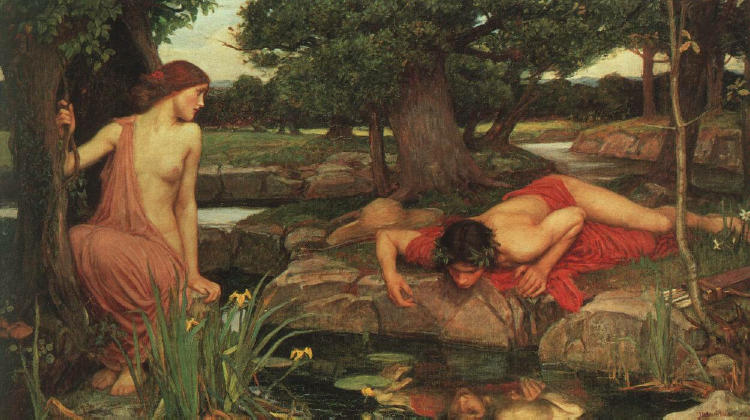OCR GCSE Latin Set Text 2023 and 2024
Echo et Narcissus is an extract from the third book of Ovid’s Metamorphoses (Transformations), published in the Cambridge Latin Anthology. The Metamorphoses was a complex and unusual epic poem, which chronicled more than 200 myths from the ancient world. Many scholars argue that it defies classification altogether, since it does not really fit in to the usual parameters of a traditional epic. The Metamorphoses was written at the start of the 1st century AD and its central theme – as the title suggests – is change and transformation.
The tales of both Echo and Narcissus resonate throughout Western art and literature and indeed Ovid’s Metamorphoses as a whole was a huge influence on key literary figures such as Keats, Dante and Shakespeare. It has also inspired numerous 19th and 20th-century works of art and music.

Echo was a nymph who endured Juno’s wrath for a trick she played on her. Juno’s husband Jupiter, the king of the gods, enjoyed regular visits to the beautiful nymphs down on earth. Eventually, the ever-jealous Juno becomes suspicious and follows him in an attempt to catch him in the act. Echo (at the behest of Jupiter) keeps Juno talking, flattering her and drawing the goddess away from her fellow-nymphs, thus allowing Jupiter to slip away from the scene of the crime. Enraged that her revenge has been thwarted by the talkative nymph, Juno curses Echo by rendering her able only to repeat the final words of another’s sentences; Echo, completely unable to say anything further on her own, suffers a harsh but apt fate in return for her loquaciousness.
Sometime after she is cursed by the queen of the gods, Echo catches sight of the beautiful young Narcissus while he is out hunting with his companions. Immediately infatuated, she follows him quietly, for of course she is unable to speak. During the hunt, Narcissus becomes separated from his companions and calls out. Hearing his words repeated back to him, as Echo is cursed to do, Narcissus is startled and calls out again, several times. Echo can only repeat what he says yet again. Eventually, she rushes towards her beloved but he rejects her on sight. All Echo can do is repeat his final words one last time before she flees in shame. Despite the harshness of his dismissal, Echo’s love for Narcissus continues to grow. Heartbroken, she spends the rest of her life wandering the hills until nothing but her echoing sound remains of her.
But Nemesis, goddess of revenge, decides to punish Narcissus, for Echo was not the only individual that had been rejected by this remarkably beautiful youth. Narcissus went through all of his life spurning the numerous advances of others, all hypnotised by his beauty. His fate was foreshadowed by the prophet Teiresias, who predicted at his birth that Narcissus would only live to a ripe old age if he never discovered own reflection. This is how Nemesis ensures his punishment: she lures him to a pool, where he leans in to drink the water and – upon seeing his own remarkably beautiful face – he at once falls deeply in love with it. Unable to tear himself away from the enchantment of his own image, Narcissus slowly wastes away, a fire of unrequited passion burning inside him. Echo laments his passing. At last, he turns into a flower with white petals surrounding a golden centre. Even in the Underworld, his spirit is doomed to gaze at himself in the Stygian waters.
The OCR set-text prescription consists of 82 lines published in the Cambridge Latin Anthology, plus a section of the text in translation between lines 57 and 58, which students will also need to study so that they understand what happens in the section of the text that has been redacted. As ever, the way the text is presented in the Anthology is entirely and infuriatingly unsuitable for teaching and therefore the classroom teacher is left with the usual challenge of how to present the work to their students. I sometimes feel quite dizzy at the thought of so many Latin teachers across the country, all spending hours producing their own workable versions of the text.
Last time I taught this text, which was many moons ago, I was still making use of the numbered method and found this in my archives:

I have the whole 82 lines presented in this way, which will prove useful should any of my clients who approach me find themselves studying this prescription. Personally, I have almost always chosen to teach the Virgil selection and this remains the more popular choice in most schools; with a text as lengthy as Echo and Narcissus, you also lose one of the advantages of choosing the verse selections over the Virgil, which is that the shorter poems can prove more manageable for students to learn.
Students generally respond very well to the story of Echo and Narcissus and indeed I have found that most of then love mythological stories that seek to explain natural phenomena such as the tale of Ceres and Proserpina (or Demeter and Persephone). The story of Narcissus should also spark considerable discussion in relation to the modern definition of narcissism (both the medical definition of the personality disorder and the one used in common parlance). It will also be great fun to explore with students the modern trend of filtered selfies and how they feel this relates to the myth.

Cartoon by Bill Whitehead.
Echo and Narcissus is not the only text that makes up the Verse Literature A selections for 2023 and 2024, as the board have also included three much shorter texts from the section of the Anthology named “Amor“: two poems by Catullus: How Many kisses? and Conflicting Emotions, plus a fragment of Petronius named Love Will Not Let the Poet Sleep. I shall look those in three separate blog posts over the next three weeks and that will involve some serious frisking of the archives! As the poems are very short, it will also be an opportunity to look more closely at the texts, which has not been possible with the longer texts.
Hi I’m home-schooled and taking Latin GCSE in the summer. One of my texts is Echo and Narcissus, and I’ve got the translation down, but to what extent do I need to memorise it? And also how do I analyse the texts? Do I analyse the english or the latin and is the board looking for the same elements to anaysis as GCSE English lit. ?
Hi Saffiya I definitely advocate memorising the translation of the text as it makes like sooooooooo much easier in the exam. Have you found my Quizlet flashcards? https://quizlet.com/class/23507259/ When it comes to analysis you will need to analyse the Latin, not the translation. So the 8-mark question in the examination requires you to quote the Latin and discuss it in detail.
Hi Emma,
As an independent learner, please can you tell me why a section of Echo and Narcissus has been redacted in the Cambridge Latin Anthology? Also, how does this affect how students are expected to approach the study of this section, compared to the original Latin.
Many thanks
The CLA – as the name suggests – offers a selection of edited texts. For the exam, students have to study a set number of lines and the authors of the CLA had the GCSE examination in mind when preparing it; they tend to select parts of the texts to give students a flavour of the work overall. Classroom teachers are free to show students the interim lines if they have time. No knowledge of the interim lines is demanded in the examination. Prose texts are even more heavily adapted to make the Latin borderline comprehensible for a student at GCSE level.
Thank you very much for the clarification, Emma.